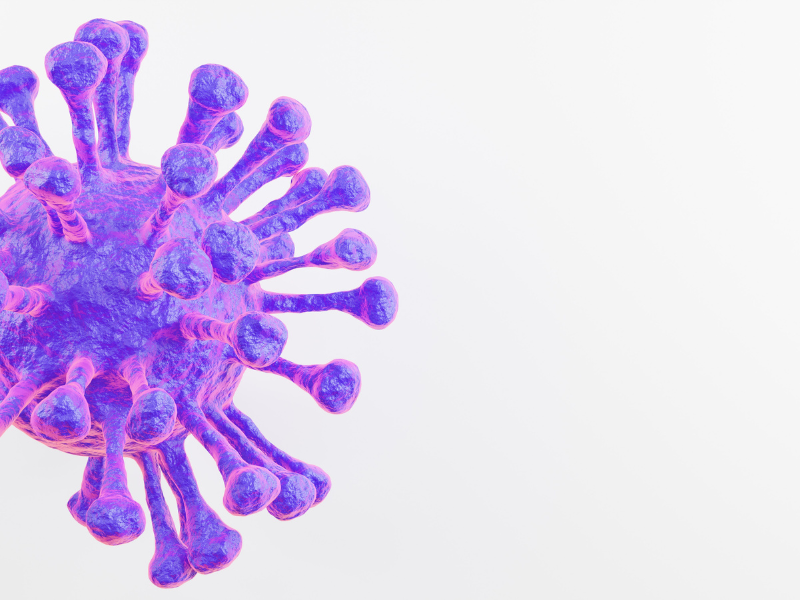
Genital herpes
Genital herpes – a painful condition
You may most often associate the word “herpes” with small, fluid-filled blisters, as well as redness, swelling, and pain in the skin around the mouth, on the lips, or in the oral cavity itself. But herpes also comes in other forms, the second most common of which is genital herpes, also known as HSV 2.
Genital herpes is herpes that primarily affects the genitals. In this article, you can learn more about how genital herpes develops. You can read about the symptoms of the condition, and you can get tips for treatment and pain relief associated with the symptoms of genital herpes.
QUR Herpes Gel
Buy your herpes cream here - Effective and discreet treatment of herpes 1 & 2
Buy here!
What is genital herpes?
Most Danes have experienced being infected with the annoying herpes simplex 1 virus, which causes outbreaks of cold sores in the mouth region – read more about herpes here . While mouth ulcers caused by the HSV 1 virus are not an unusual phenomenon, herpes simplex 2 – also known as genital herpes – is not as common.
It is estimated that one in five Danes is infected with genital herpes, which causes painful sores on the mucous membranes and skin around the genitals. Although the disease has not gained as much traction as HSV 1, it is far from uncommon.
How is genital herpes transmitted?
Just as herpes simplex 1 is transmitted through close physical contact, including primarily kissing, genital herpes is transmitted through sexual contact. Transmission of the virus can occur when one of two sexual partners is infected with the HSV 2 virus. The risk is greatest during an outbreak, but can also occur before an outbreak – even before symptoms are noticed.
HSV 2 similarly attacks the cells in the epidermis and works its way via the nerve pathways to the nerve cell itself, where the virus lies latent until something triggers an outbreak.
The virus, in other words, becomes an integral part of the body. This means that there is no cure for herpes, only treatment that can relieve symptoms and shorten the duration of each outbreak.
Genital herpes and pregnancy
If you are pregnant, you should be aware that you can transmit the herpes virus to your child if you have an outbreak during childbirth. The risk of transmitting HSV to your child is greatest if you become infected with herpes during pregnancy (source: Netdoktor.dk).
You should always consult your doctor if you have been infected with genital herpes in advance, or if you have been infected while you are pregnant. The doctor can then help you prevent outbreaks and thus transmission of the infection. The doctor can also tell you that it can be dangerous for the baby if the mother has a herpes 2 outbreak during childbirth. The newborn is easily infected and this can lead to a serious risk of infection in the child and in some cases be life-threatening for the newborn.
It is a good idea to prevent genital herpes infection by avoiding unprotected sex. This is generally because you need to protect yourself against both HSV 1/cold sores and HSV 2/genital herpes. And since the HSV 1 virus, which causes cold sores, can also be transmitted to the mucous membranes of the genitals, you should also avoid having oral sex with someone who has a herpes outbreak in the form of cold sores on the lip.
When is herpes type 2 contagious?
As is the case with the HSV 1 virus, genital herpes infection will be transmitted through close physical contact during an outbreak. However, herpes can also be transmitted shortly before an outbreak, as there will be herpes virus on the skin.
It is not easy to predict herpes outbreaks, as it is not known for sure what triggers them. However, there is broad agreement that during periods of reduced immune function – for example due to illness, stress or medical treatment – people are more susceptible to herpes outbreaks than at other times.
Herpes can also be provoked by damage to the skin, for example in the form of cuts, scratches, etc. It is therefore important that you take care when having sex and make sure to use lubricant together with a condom. In this way, you can minimize the risk of a resulting herpes outbreak.
What are the symptoms of genital herpes?
If you are infected with herpes, you will feel a tightening sensation in the skin where the outbreak begins. There may also be tingling, buzzing or prickling in the skin, and there will typically be swelling and redness in the affected area.
After a short time, the first fluid-filled blisters will appear. These are small and clustered together. It is very important that you do not pick at the blisters, as you risk transferring the virus from one part of the body to another – or to other people – by touching them. And if you pick, you can also prolong and worsen the outbreak, and bacteria can enter the wound and cause scarring.
A herpes outbreak usually lasts 7 to 10 days without treatment. After a few days, a scab will form – and you shouldn’t pick at it either. When the outbreak is over, the scab will fall off. If you have left the sore alone, there will be no scarring.
What does genital herpes feel like?
Anyone who has had a cold sore outbreak on their lips knows that it's not pleasant. It stings, tightens and burns the skin, which becomes red and swollen and breaks out into fluid-filled blisters. And you can imagine how uncomfortable this must feel when the cold sore is located in one of the most sensitive areas of the body.
If you have an HSV 2/genital herpes outbreak, it can be painful to ride a bike, play sports, or just sit on a chair. At the same time, it can be very difficult to keep the wound free from contact with clothing, just as it can be difficult to maintain good intimate hygiene with an HSV 2 outbreak.
How is genital herpes treated?
Genital herpes is not something we go around talking about. For many people, having genital herpes is associated with great shame, it is downright embarrassing and many feel downright disgusting. That is why it is taboo and difficult to talk about – and that is why it can be difficult to get the right help.
However, it is very important that you consult your doctor if you have been infected with herpes. This applies mostly to herpes 2, but actually both variants. There is no specific cure for either herpes 1 or herpes 2 / genital herpes – once the virus is in your system, it is there forever. But you can relieve and treat the symptoms so that an outbreak does not feel so bad.
The most commonly used forms of medication for genital herpes include topical and oral medications. The former must be prescribed by a doctor and taken as directed. Genital herpes ointments and creams are available over the counter and can be applied as needed.
Both forms of treatment should be started as soon as you notice the initial symptoms of a herpes outbreak. These symptoms include redness, swelling, and a burning or tingling sensation in the skin.
If genital herpes treatment is started immediately after the symptoms have appeared, you have the best chance of putting a damper on the outbreak, so that it is both milder and of shorter duration. It is therefore important that you do not wait to treat until the blisters have started to appear on the skin - because in that case the treatment will only have a limited effect. Therefore, you should have the treatment ready until you notice the first symptoms. If you have to contact the doctor or the pharmacy first, the precious time when it is most effective to treat your outbreak has quickly passed.
QUR Herpes gel has therefore made some very small thin sachets or "letters" that each contain 1.5 mg of herpes gel. You can keep these letters in your purse, at work or wherever you need them. You just have to be quick to find them the moment you notice the buzzing, tingling or swelling that tells you that a new outbreak is coming. The sooner you apply the gel to the affected area, the greater the likelihood that you can protect yourself against a large and long-lasting outbreak. A large consumer survey with many hundreds of herpes patients showed that 77% experienced a halving of the time an outbreak lasts AND a halving of the pain/discomfort that an outbreak usually causes. Read more about our herpes gel here.
QUR Herpes Gel
Buy your herpes cream here - Effective and discreet treatment of herpes 1 & 2
Buy here!

